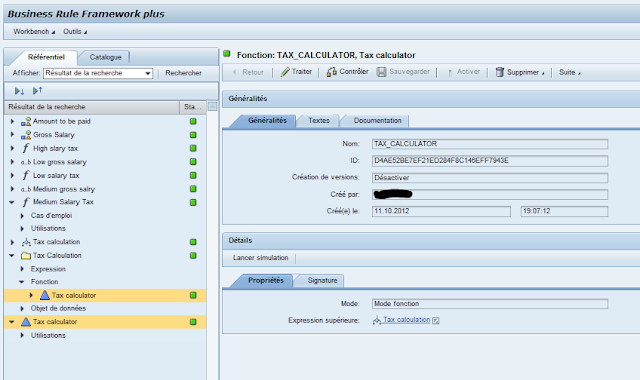Business Rule Framework plus ( BRFplus ), also known as Formula and Derivation Tool ( FDT ), aims to "Make hard-coded rules in systems, process flows and services explicit and easy to change for business professionals. Replace complex table-based determination by an intuitive rule-based approach.".
BRFplus is Business Rules Engine allows modelling and access rules. These rules consist of building blocks such as decision tables, decision trees and formulas, its purpose is to allow business professionals to change the rules quickly without the need of IT intervention ( ABAP programmer ). This way the system becomes nimbler with rules than can be changed faster.
Here is a sample code that could be used to consume our TAX_CALCULATOR BRFplus function.
BRFplus is Business Rules Engine allows modelling and access rules. These rules consist of building blocks such as decision tables, decision trees and formulas, its purpose is to allow business professionals to change the rules quickly without the need of IT intervention ( ABAP programmer ). This way the system becomes nimbler with rules than can be changed faster.
we build on the SAP tutorial Building a Tax Calculation Application to show how we can implement the BRFplus function we already created from that tutorial.
Here is a sample code that could be used to consume our TAX_CALCULATOR BRFplus function.
*---------------------------------------------------------------------* * Report Z_BRFPLUS_TEST * *---------------------------------------------------------------------* * * *---------------------------------------------------------------------* REPORT z_brfplus_test. PARAMETERS: p_salary TYPE amount. DATA: lo_fuction TYPE REF TO if_fdt_function, lo_context TYPE REF TO if_fdt_context, lo_result TYPE REF TO if_fdt_result. DATA: lo_message TYPE REF TO cx_fdt. FIELD-SYMBOLS:TYPE if_fdt_types=>s_message.
DATA: ls_tax TYPE if_fdt_types=>element_amount, ls_salary TYPE if_fdt_types=>element_amount. START-OF-SELECTION. CLEAR: ls_tax. ls_salary-number = p_salary. ls_salary-currency = 'EUR'. TRY . " Get BRFplus function lo_fuction ?= cl_fdt_factory=>if_fdt_factory~get_instance( )->get_function( 'D4AE52BE7EF21ED284F8C146EFF7943E' ). " Set the BRFplus function context ( input variables ) lo_context = lo_fuction->get_process_context( ). lo_context->set_value( iv_name = 'GROSS_SALARY' ia_value = ls_salary ). " Process the BRFplus function lo_fuction->process( EXPORTING io_context = lo_context IMPORTING eo_result = lo_result ). " Retrieve the BRFplus function result lo_result->get_value( IMPORTING ea_value = ls_tax ). WRITE ls_tax-number. WRITE ls_tax-currency. CATCH cx_fdt INTO lo_message. LOOP AT lo_message->mt_message ASSIGNING. WRITE:-text. ENDLOOP. ENDTRY.
The BRFplus function GUID can be retrieved by going to transaction BRFplus in the function's General TAB.
If we test our rule in the Business Rule Framework we get the following result.
Finally we can check that using our program yields the same result.
 |
| BRFplus function details |
If we test our rule in the Business Rule Framework we get the following result.
 |
| Simulation framework |
 |
| Context values ( BRFplus function input values ) |
 |
| BRFplus funtion similation steps and Result |
Finally we can check that using our program yields the same result.
 |
| Program input |
 |
| Program result |
This Information which you provided is very much useful for us.. SAP Audit Services
ReplyDeleteThis is very good news for market visitors. I suggest to every one for read this because there are lots of information which is help for promoting business.
ReplyDeleteFree Nifty Future Tips
For SAP BRFplus training visit: https://sites.google.com/site/sapbrfplustraining/
ReplyDelete